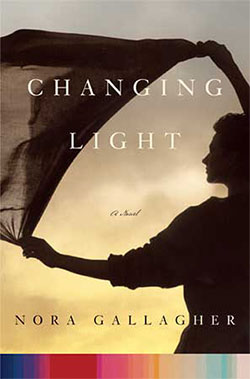An Excerpt from Changing Light
Part One: The Man by the River
March, 1945
Eleanor stood up in the garden from tilling a plot for early lettuce, shook off her hands and stuffed them into the sleeves of her brown wool sweater. The wind was up; it blew dirt from the adobe wall into the newly hoed ground, dry pods from the chamisa bushes rattled like bones. She walked towards the house, sniffing the air like the dog beside her, climbed the steps to the door, opened it, walked past the stove, her hands still nestled in the sleeves -- like one of those Chinamen she thought to herself -- and turned into the bedroom where she put him last night.
All night long he listed between sleep and a rushing wakefulness muttering in what she thought was German but couldn't be sure. “Lotte,” he cried, “Raus aus dem Feuer!” And then, a word she thought might be English but didn't know. “Implosion,” he said. She had placed rags on his head soaked in water and chamisa to break his fever, get him to sweat. He looked to her like men she’d met in New York: dark, Jewish, probably; curly black hair. Last night when she found him, lying in the bosque beside the river, his face was turned towards the sky. The dog circled him. She bent over him, her heart beating in her throat. His lips were cracked, his eyelids shut. His wet khaki pants clung to his legs like vines. He grasped a pair of boots by their laces and a heavy belt in his right hand. Her eyes moved from the boots to the river and the mesa that rose up on the other side.
She bent down. “Hello?” she said, “Hello.” His head moved, the eyelids lifted. His eyes were a pale, startling blue. “Lotte?” he said.
“No,” she replied. His accent on the name was thick, and she heard someone’s voice speaking with these inflections in her memory, like an echo off a high stone wall. “Are you ill?” “Ill,” he repeated, ran his tongue over his lips. She walked back through thick sand to the Ford, took her canteen out of the glove box, returned. He drank in small gulps like a bird; she could see the water traveling down his throat. The water fell out of his mouth and onto his chest and he shivered. She jerked the canteen away. “Can you walk?”
She wrapped his head in her father’s old sweater, the arms crossed over his eyes. She stood between his legs, grasped his ankles and pulled. When she got him to the Ford, she squatted down, put her arms under his shoulders and heaved him up to sitting against the front tire, then pulled him forward, whispering to him as she did to a horse, “Easy, now easy, don”t fall.”
She had planned to drive him straight to the hospital, but as she started the engine, he whispered to her, “No doctors.” She had looked over at him and seen in his face a barely controlled desperation. And so she had taken him home. She shouldered him into the house as she had her brother when he came home drunk from a debutante’s party, and tipped him into bed.
She stood over him in the room plastered white with thick adobe walls that she and Estaban built last May before the sudden rain came in July and washed all the plaster off the outer walls and the dirt out of her garden leaving only gravel and she had to dig her carrots up with a pick.
He whispered in his sleep, half-wakeful. His eyes opened and he saw her arm pass over his body like the shadow of a bird.
“What happened to you?” she asked. Leo turned his head to the wall, licking his lips.
We tickled the dragon’s tail, Leo thought. One of us was burned.
Slotin was moving the two half moons together with screwdrivers. The counter ticked and the red signal lamps were blinking. The lamps blinked faster as Slotin moved the half spheres closer like a drummer or a Japanese with his chopsticks.
Then there was the sound of a screwdriver hitting the floor. The meter stopped. Leo heard the silence first. He yelled to Slotin, “Raus aus dem Feuer!”
The moon had pulled him across the deserted streets, between the trees, to the hole in the fence that the teenagers made to out-fox the guards. His legs felt like sacks filled with sand. He got down on his hands and knees, and bowed his head, feeling along the sharp ends of the linked fence with his hands first before he pushed himself through. He sat on the other side, his breath hot in his lungs, and then started to weep, his whole body shuddered. To be free of the place. He pulled the knapsack stuffed with a blanket and bread and cheese through the fence after him, adjusted the heavy belt stuffed with money that he carried with him through all border crossings, stood up and began to find his way. In the dark were animal shapes, moving through the trees, a deer, then a wild turkey, its wings folded neatly against its round breast. After awhile he noticed the small swift bats flying past his nose, sonar alerting them to his head. He felt a sudden calm, to be among them, the life of the world; as a boy he had always loved the dark.
